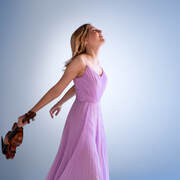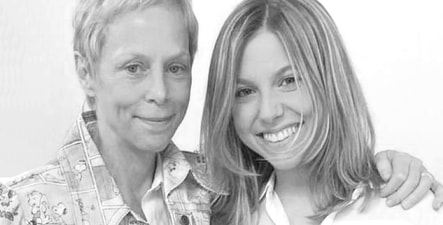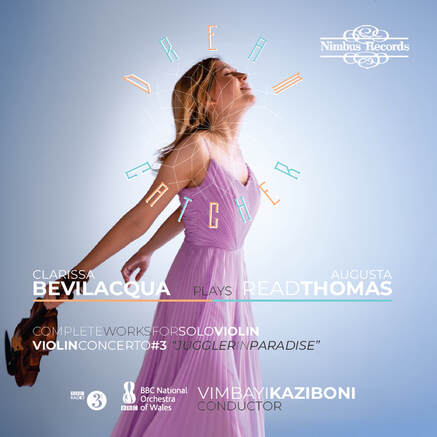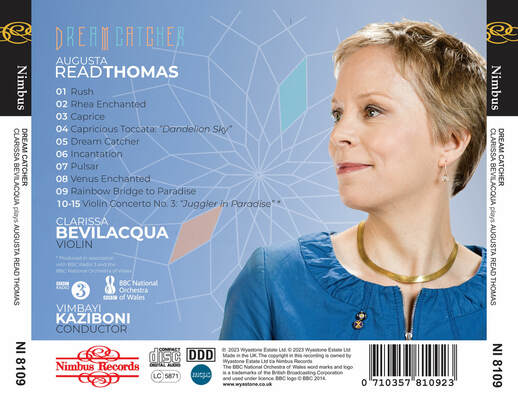Augusta Read Thomas, works for violin
Clarissa Bevilacqua, violin
Juggler in Paradise, Concerto No. 3 for violin and orchestra
Nine solo works for violin including Dream Catcher
BBC National Orchestra of Wales, Vimbayi Kaziboni, conductor
Augusta Read Thomas and Adrian Farmer: co-producers
 Clarissa Bevilacqua
Clarissa Bevilacqua
'Clarissa is also the Grand Prize winner of the Cape Symphony International Online Violin Competition, is not only a wonderful violinist, but also a wonderful person. We received applications from around the world and the quality was extraordinarily high, but her exceptional talent stuck out above the rest. A true violin prodigy, Clarissa would have been an outstanding guest artist for the May 2020 concert. Sadly, the pandemic forced us to cancel the concert, but Clarissa will definitely join us in the future. Enjoy her conversation with me, a glimpse of her award-winning performance, and a special demonstration of her talent. Congratulations to Clarissa!' Jung-Ho Pak, Artistic Director Cape Symphony
 Augusta Read Thomas and Clarissa Bevilacqua
Augusta Read Thomas and Clarissa Bevilacqua
'Native American tradition attaches special meaning to dreams. One tradition was to hang a 'dream catcher' that would move freely in the night air. According to tradition, good dreams know their destination: they slip through the hole in the center of the web and glide gently down the feather into the subconscious of the dreamer. Bad dreams become entangled and dissipate with the light of the dawn. Although highly notated, precise, carefully structured, soundly proportioned, and while musicians are elegantly working from a nuanced, specific text, I like my music to have the feeling that it is organically being self-propelled - on the spot. As if we listeners are overhearing a captured improvisation.' Augusta Read Thomas
Juggler in Paradise: Concerto No. 3 for Violin and Orchestra
Flowering across a 20-minute arch, the work can be considered a series of poetic outgrowths and variations which are organic and, at every level, concerned with transformations and connections. The violin solo is present for almost the entire sweeping arc, serving as protagonist as well as fulcrum point, around which all musical force-fields rotate, bloom, and proliferate. The Concerto begins with a slow, spacious, elegant solo for violin, accompanied, at first, by delicate sounds in the harps and percussion. With each new phrase the tempos quicken, the intensity climaxes and suddenly we are in a spacious landscape leading to the final minutes of the composition, which are dreamy, as if the soloist were delicately floating while chanting an ardent incantation. Juggler in Paradise, is a poetic image for the way soloist and orchestra relate, a continuous rhapsodic cadenza set against colourful "paradisiacal constellations." It's physical, too: dance is often close by. When the violin starts to speed up, the score suggests playing "as if 'juggling' the notes, rhythms, articulations" and, further on, "like several objects in motion, in the air." The animated, quicksilver orchestrations, at times pointillist like a Seurat paining, at other times akin to bold brush strokes, full and brassy, are continuously juggling and flexibly rearranging."
Mareen Buja interviews Clarissa Bevilacqua: Interlude, 16 March 2023
Peter Quantrill, The Strad, 23 Feb 2023
Claire Jackson, BBC Music Magazine, 21 Feb 2023
Esteban Meneses,I Care if You Listen, 6 Jan 2023


